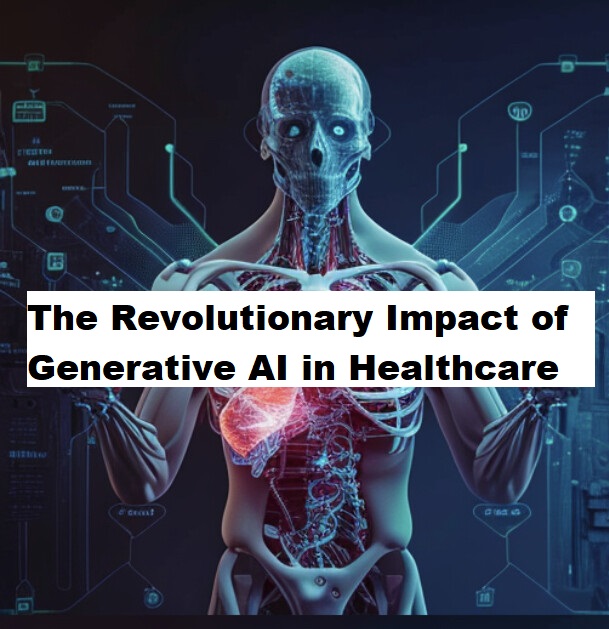
Introduction
Generative Artificial Intelligence (AI) has emerged as a groundbreaking technology that leverages machine learning and neural networks to generate new content based on patterns and data. In recent years, its application in healthcare has opened up promising avenues for diagnosis, treatment, drug discovery, and personalized medicine. This article explores the revolutionary impact of generative AI in healthcare, revolutionizing patient care and shaping the future of medicine.
1. Personalized Diagnostics
Generative AI models have the potential to analyze vast amounts of patient data, including medical records, lab results, and imaging scans, to provide personalized diagnostics. These models can detect patterns and subtle abnormalities that might elude human experts, leading to earlier and more accurate diagnoses. By leveraging deep learning algorithms, generative AI can contribute to the early detection of diseases such as cancer, Alzheimer’s, and heart conditions, improving patient outcomes and reducing healthcare costs.
2. Drug Discovery and Development
Developing new drugs is a lengthy and costly process. Generative AI is revolutionizing this domain by expediting drug discovery and development. By simulating molecular interactions and predicting potential compounds, AI can identify promising drug candidates faster than traditional methods. This technology significantly reduces the time and resources required to bring new medications to the market, making healthcare more accessible and effective.
3. Medical Imaging Advancements
Medical imaging plays a crucial role in diagnosing various conditions, but it often requires skilled radiologists to interpret the results accurately. Generative AI models can aid radiologists by enhancing image resolution, reducing noise, and automating image segmentation. This assists in identifying abnormalities more efficiently and improves the accuracy of diagnosis, especially in remote or resource-constrained areas where expert radiologists might be scarce.
4. Surgical Planning and Training
Generative AI can be a game-changer in surgical planning and training. By analyzing a vast array of surgical cases and their outcomes, AI models can assist surgeons in devising personalized surgical plans for each patient. Additionally, through simulating surgical procedures, AI enables surgeons to practice and refine their skills in a risk-free virtual environment. This ultimately enhances surgical precision, reduces errors, and enhances patient safety.
5. Mental Health Applications
Mental health conditions like depression, anxiety, and post-traumatic stress disorder (PTSD) can be challenging to diagnose accurately. Generative AI can aid mental health professionals by analyzing patient data, including speech patterns, facial expressions, and behavioral data, to identify early signs of mental health issues. Furthermore, AI-powered chatbots and virtual assistants can offer personalized support and therapy, ensuring patients receive timely and appropriate care.
6. Drug Adverse Event Detection
Monitoring the safety of medications is vital to prevent adverse events and ensure patient well-being. Generative AI can process electronic health records and social media data to detect and track potential adverse drug reactions in real-time. By rapidly identifying safety concerns, healthcare providers and regulatory agencies can respond promptly, protecting patients from harm and enhancing drug safety protocols.
7. Disease Progression Prediction
Predicting disease progression is essential for devising effective treatment plans. Generative AI models can analyze patient data over time to forecast disease trajectories accurately. This enables healthcare professionals to intervene proactively, adjust treatments, and improve patient outcomes by tailoring care to individual needs.
8. Synthetic Medical Data Generation
Data privacy and security concerns often hinder AI research and development in healthcare. Generative AI can generate synthetic medical data that closely resembles real-world data while preserving patient privacy. This synthetic data can be used for training AI models, promoting innovation without risking patient information exposure.
Conclusion
Generative AI is revolutionizing healthcare across various fronts, ranging from personalized diagnostics to drug discovery, medical imaging, mental health applications, and much more. Its ability to process vast amounts of data, identify patterns, and generate valuable insights is transforming the way medical professionals approach patient care and treatment. However, the ethical and regulatory implications of implementing AI in healthcare must be carefully addressed to maximize its potential while safeguarding patient interests. As the technology continues to evolve, it promises to reshape the future of medicine, fostering a new era of precision, accessibility, and improved health outcomes for people worldwide.

